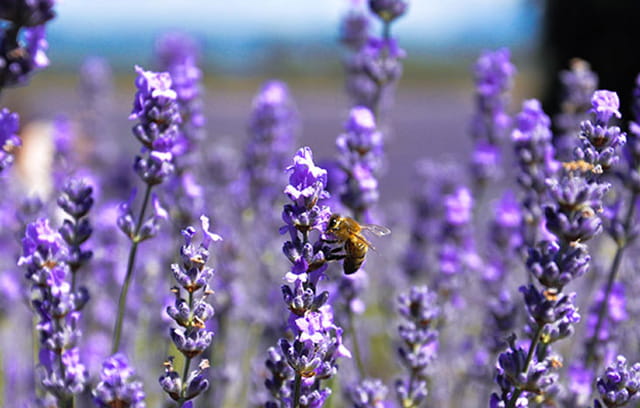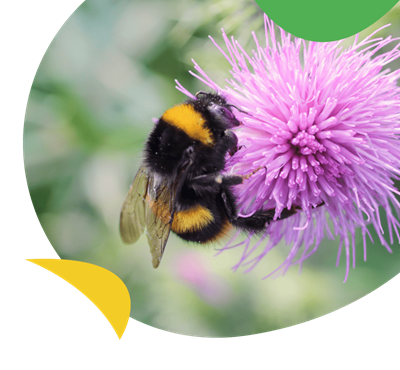Bees are an essential part of our ecosystem. Don’t let their nasty sting put you off - they’re a friend of nature, and without them a lot of things we take for granted would look very different.
Sadly, their species is in decline. A loss of their natural habitats such as flowers and wild meadows means many of them are dying, and more needs to be done to protect our most prevalent pollinator. If the bees go, things like fruit, vegetables, wheat and even meat could soon be a thing of the past.
But it’s not just food they help create - many of our top UK holiday destinations rely on our buzzing buddies. We look at what our most popular beauty spots would look like in a world without bees. The images might just encourage you to water your plants.
Before and after: UK beauty spots in a world without bees
Eden Project, Cornwall
The Eden Project in Cornwall is a popular tourist destination, with visitors from all over the world experiencing this UK beauty spot. Set in the naturally stunning Cornish countryside, it's famous for its wonderful landscape and contemporary architecture. The Eden Project acts as a gateway between plants and people, helping the public learn about our relationship with what grows from the ground. The huge biodomes house tropical plants and the largest indoor rainforest.
As we can see from the after picture, while the greenery remains inside the controlled environment of the building, the landscape outside has drastically changed. This beauty spot now looks aged, with brown, dead foliage covering the ground - a stark contrast to the vibrant plants that would be able to continue to grow in a controlled environment.
In a world without bees it asks the question; would we only be able to interact with plants in biodomes?
Explore our Cornwall holiday parks and plan your visit to the Eden Project.
Snowdonia National Park, Wales
Snowdonia is recognised for its breathtaking views and acres of stunning landscapes. Home to Snowdon, the highest mountain in England and Wales, this beauty spot also boasts the largest natural lake in Wales and is only a stone’s throw away from Brynowen Holiday Park. The hardy Welsh landscape allows for a variety of wildlife from mountain goats to otters.
However, we can see from these images, in a world without bees the landscape would become desert-like, with darkened surroundings and the deep blue lake brown and uninviting. Usually bursting with plant life from wild heather to alpine meadow-grass, the landscape would be entirely unrecognisable.
Seven Sisters, East Sussex
The Seven Sisters are situated in the South Downs National Park and boast 280 hectares of dazzling white chalk cliffs. These eye-catching cliffs have become a popular tourist destination and it’s no wonder why with the miles of English coastline and rolling green hills. The area is a great place to take part in one of the many outdoor activities available, from walking the cliff edge to canoeing in the clear water to bird watching.
The after image paints a very different picture. Brown wilted grass and dismal murky sea water surrounds the grey aged cliffs that were once so brilliantly bright. Without plants and such vibrant nature, this typical beauty spot becomes much less inviting and no doubt would fall off the lists of people’s go to staycation spots.
Lake Windermere, The Lake District
Windermere is a large lake nestled in the valleys of the Lake District, a popular UK staycation spot and the longest natural lake in England at 10.5 miles long. It's home to dynamic wildlife and vivid surroundings, as well as sparkling waters.
Windermere is almost unrecognisable in the after image. Once filled with bouts of greenery, it’s now become wilted and diminished, with bare stick-like trees and dingy and sombre waters.
We're lucky enough to have a whole host of wonderful holiday parks in the Lake District and close enough to Windermere for a peaceful day out.
Cairngorms National Park, Scotland
Cairngorms National Park is a mountain range in the eastern Highlands of Scotland. During the summer months, the Cairngorms boast endless views of flourishing natural landscapes. A high number of rare species grow in the national park including Highland saxifrage, alpine saxifrage and Highland cudweed. The wildlife is also something to marvel at with animals like nowhere else in the UK.
In a world without bees, these surroundings are set to become derelict, with nature and wildlife alike vanishing. The once vibrant landscape is now home to a wilted and darkened atmosphere. The animals that rely on berries and seeds would also be at huge risk, either moving to other habitats or becoming extinct themselves.
Tummel Valley Holiday Park is the perfect pit stop after exploring all that the Cairngorms have to offer.
Bee declines affect more than just staycations
Bees affect much more than just our pretty landscapes. If bees were to become extinct, there would be a whole host of tragedies to follow, stretching further than simply the travel industry.
Many of the foods that we spot everyday in our supermarkets would disappear, giving us less options of what we could eat. Our great British favourite of fish and chips would become just fish, with potatoes relying on bees to grow. Other favourites like orange juice, almonds and even coffee would be off the cards.
Without bees pollinating our fields, we would also witness declines in farm animals such as dairy cows, which rely on fresh grass to eat. No longer being able to feed our cattle and other grazing animals, we would lose a significant portion of our milk, cheese, butter, yoghurt and ice cream.
But it’s not all doom and gloom, there are ways we can help!
How to protect bees in the wild

Although bees are on the decline, there’s plenty that we can do to help get them back to their usual numbers. Below are some top tips on what the British public can do to help protect the bee species:
- Adapt your garden by planting more bee-friendly flowers so that bees will have easier access to nectar.
- Help a bee in need! If you spot a bee struggling, mix two teaspoons of white granulated sugar with one teaspoon of water and leave it next to the bee, close enough so that it can have a drink.
- Be careful with what you’re spraying on your plants! Try to avoid using pesticides if you can.
- Make a bee hotel. These adorable spots are easy to make and can help give bees a safe place to rest their wings.

